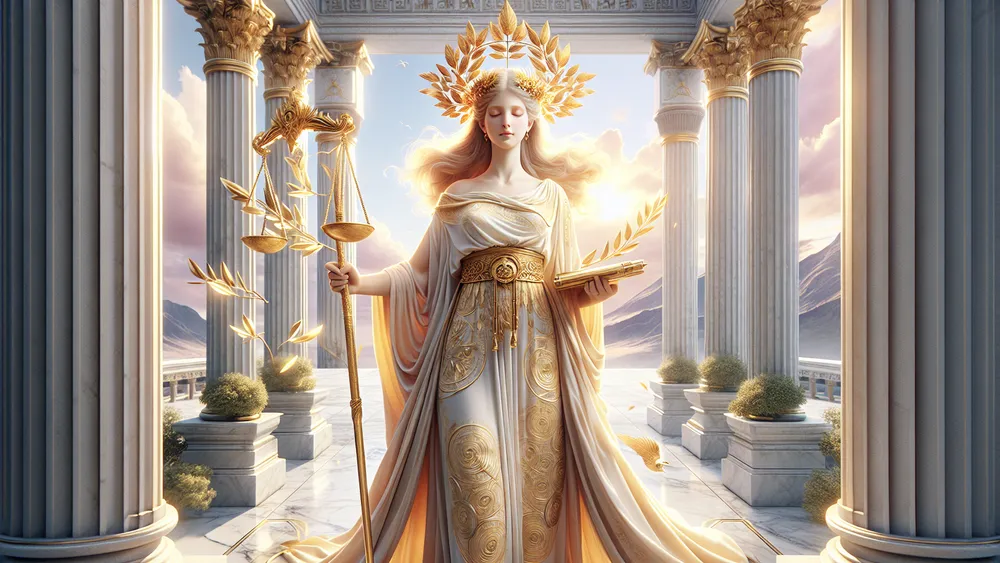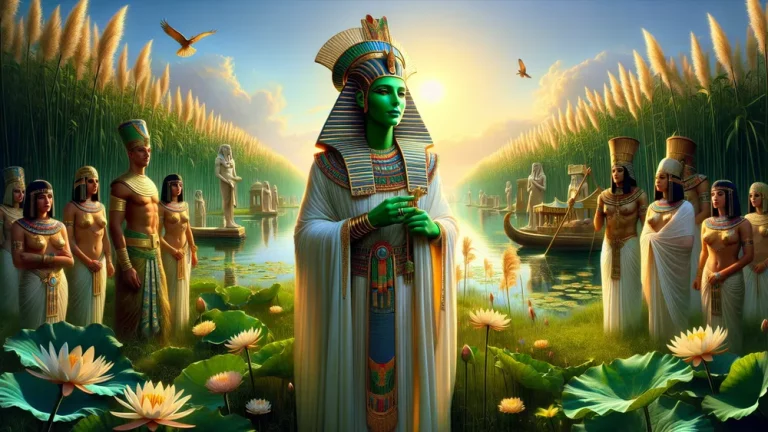Eunomia: Greek Goddess Of Good Order And Lawful Conduct
In the complex stories of Greek mythology, with gods and goddesses who both controlled the heavens and managed how things should work in both the moral world and nature, Eunomia is an interesting figure whose role went beyond just divine matters – it also included human life. She is best known as the representation of good order, following fair rules, and running things in a cooperative way.
Key Points:
- Eunomia means Good Order and represents fair laws and balance for people and nature.
- Daughter of Zeus and Themis, she is one of the Horae, alongside Dike (Justice) and Eirene (Peace).
- She keeps seasons in order, ensures fairness in governments, and keeps natural and human systems steady.
- Ancient Greek cities admired her ideas, especially during reforms or lawmaking for better fairness.
- Spartans connected her to discipline and order for keeping society stable and unified.
- Often seen with a staff, scales, or flowers, she symbolizes leadership, balance, and growth.
- In myths, Eunomia and her sisters stand guard at Mount Olympus and keep natural and social harmony.
Her name comes from the Greek words “eu” (good) and “nomos“ (law), which explain what she does as a deity – encouraging justice and keeping things steady not only in how society works but in nature as well. She is one of the Horae, a group of goddesses related to both the seasons and order. Together with her sisters, Dike (Justice) and Eirene (Peace), they form a small group.
This group is about the key values needed to make society run smoothly. Instead of chaos, there is balance. Think about how changes in the weather go hand in hand to form patterns that work properly. Eunomia’s role keeps everything steady and fair, both in the natural world and in how people create rules. She helped Greek city-states make fair laws during times when change was needed.
In this blog, I will explain her family connections, her importance as someone who brings steadiness, and how she plays a bigger role in making sure the universe stays organized.
Eunomia: Overview and Key Facts
| Key Aspect | Details |
|---|---|
| Name | Eunomia (Εὐνομία), which means “Good Order” or “Governance” in Ancient Greek. |
| Type of Deity | She is one of the Horae, goddesses linked to seasons, natural structure, and the idea of following fair rules. |
| Parentage | The child of Zeus, the most powerful Olympian god, and Themis, goddess of law. |
| Siblings | She works with her sisters, Dike (Justice) and Eirene (Peace), to cover the key ideas of society. |
| Domain | Her responsibilities include things like governance, fairness in laws, and making sure the seasons follow their pattern. |
| Symbolism | She stands for balance, fair laws, and the kind of order that keeps a community peaceful and stable. |
| Role in Nature | She keeps nature steady by helping the seasons follow their regular cycle without disruption. |
| Role in Society | Her ideas helped ancient Greek cities come up with fair rules and reforms when improving laws was needed. |
| Depictions in Art | Artists often showed her holding symbols like flowers, for growth, or a scepter, for power and leadership. |
| Source Texts | She is mentioned in Hesiod’s Theogony and other texts that talk about the Horae and their roles. |
| Civic Influence | Cities referred to her values whenever they had to fix or change laws to restore societal balance. |
| No Known Cult | She didn’t have a specific worship group, but her ideas were respected for what they represented. |
| Mythological Role | She worked to help Zeus keep the natural world and human morality in sync through fair rules and decisions. |
Who is Eunomia in Greek Mythology?
To understand why Eunomia is important in Greek mythology, it helps to look at her part as one of the Horae, her family ties, and what she does as a deity. Her story begins with how she is seen as the goddess of order and good law. We will talk more about who she is and what she stands for, including her influence on both the heavens and the human world.
Eunomia: The Hora of Order and Good Law
Eunomia, one of the Horae in Greek mythology, has a critical part in keeping things orderly and making sure governance works in both the world of the gods and among mortals. She was born to Zeus, the main Olympian god, and Themis, the Titaness who stands for law and order.
Because her parents focused on bringing justice and harmony, Eunomia continues their work by maintaining balance in the world. Together with her sisters, Dike (Justice) and Eirene (Peace), she plays a role in keeping moral and natural systems stable. She has many responsibilities. The main thing Eunomia does is make sure people follow laws in society. She also helps ensure that governments work fairly and that the seasons change smoothly without problems.
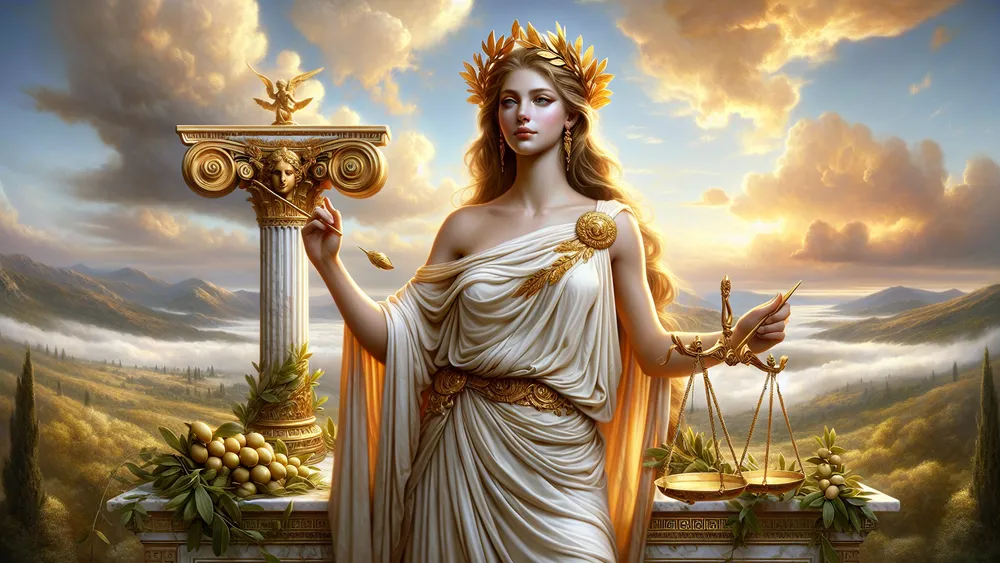
You can think of her in some ways as being like the rules we have today, which are there to keep things fair and balanced. Although there aren’t many stories that involve just Eunomia, she is often mentioned when talking about the Horae, who collectively have the job of keeping things steady. What she stands for is very important to Ancient Greek life, including ideals like fairness, responsibility, and tradition.
Here are some of her main roles:
- Helping people follow rules and customs in Ancient Greek society.
- Maintaining harmony through the regular flow of the seasons.
- Standing for fairness, balance, and accountability in governance.
Eunomia, a Greek goddess, ensures fairness, order, and smooth governance while keeping society and nature balanced.
Eunomia in Hesiod’s Theogony
In Hesiod’s Theogony, Eunomia is described as one of the Horae, the daughters of Zeus and Themis. Together, they stand for the rules of nature and society that keep the universe running as it should.
Alongside her sisters, Dike (Justice) and Eirene (Peace), Eunomia is viewed as one of the main forces behind Zeus’s rule, acting as a keeper of order both in the heavens and on Earth. Her part connects the universe to human life. One of her purposes is to make certain that the seasons and rhythms of life follow what the gods’ will calls for.
Though specific stories about Eunomia are missing in Theogony, her inclusion shows how important she is to the bigger picture of the gods keeping everything in order. Today, governments rely on rules to keep societies stable. Similarly, Eunomia represents the laws of the universe, which ensure that everything stays in balance.
Her role in Hesiod’s writings reflects how much the Ancient Greeks respected order as one of the most basic and necessary parts of existence. The Horae worked as forces against chaos, and without them, the gods’ authority – and all of life – would fall apart.
How Eunomia is Shown in Myths and Art
Myths about Eunomia don’t focus much on specific stories. Instead, she is seen as important because of what she stands for – order and good governance. Unlike Olympian gods, who often play a big part in major mythological tales, Eunomia is described in a general way. She stands for the ideals she represents rather than taking part in dramatic adventures.
In many surviving writings, she is listed as one of the Horae. They guide cycles of nature, laws in societies, and balance in the universe. For example, in the works of Hesiod, the Horae are described as the daughters of Zeus who oversee divine order. But they are not given their own detailed stories.
This means that Eunomia is more like an idea that guides people than an active character telling a story. What she influences is found mostly in ideas about fairness, nature, and stability that the gods uphold. In art, Eunomia is pictured as a symbol of the values she stands for.
You often see her holding a staff or scepter, which means authority, or scales showing fairness and justice. At times, she even has flowers with her, connecting her to the seasons and growth. These themes appear in vases and other works made during the classical and Hellenistic periods.
But there are not as many depictions of Eunomia as there are of gods with bigger roles in myths. Most of the time, she is part of a group with her sisters, Dike (Justice) and Eirene (Peace). Together, they are shown as bringing balance to the way society and nature work.
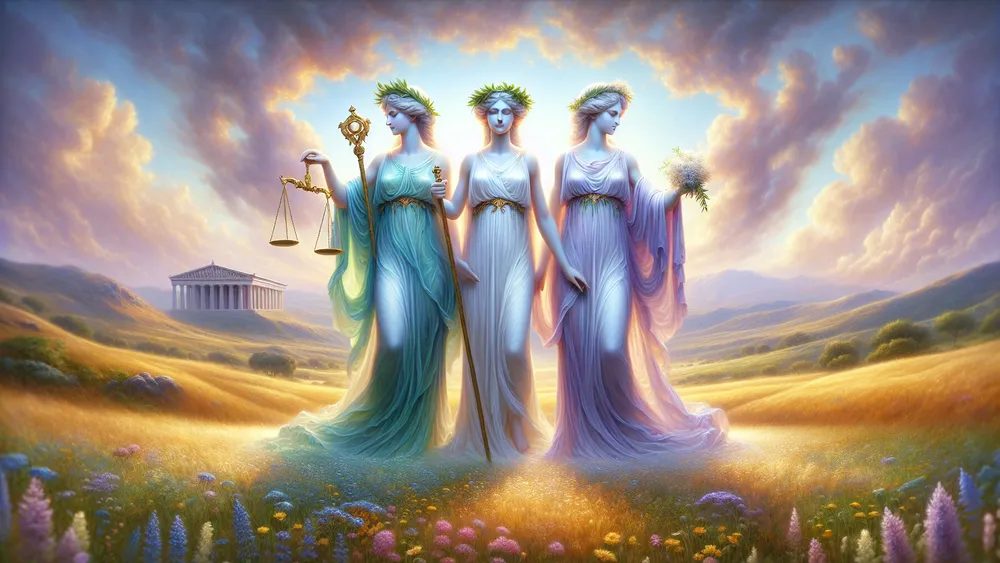
- Common Symbolism of Eunomia in Art:
- Scepter or staff (authority).
- Scales (fairness and balance).
- Flowers or wreaths (seasonal renewal and harmony).
- Grouped with Dike (Justice) and Eirene (Peace) to reflect social ideals.
Symbols and Traits of Eunomia
Since we have already talked about how Eunomia is seen in mythology and art, we can now focus on the symbols and traits that help explain her role and meaning. After learning how she fits into myths, we should also think about what she stands for. It’s important to look at the ideals she represents and the virtues she is tied to.
These are connected to how she influences both society and nature. Let’s closely examine the key things associated with her and what they mean.
What Eunomia Stands For: Justice, Order, and More
Eunomia represents ideas that were important in Ancient Greek myths and everyday life: justice, order, and harmony. Her name translates to “Good Order.” This points to her main purpose: guarding structure and fairness. These ideas weren’t just about how societies worked; they also included the balance of nature and the universe. The Ancient Greeks believed the gods were responsible for keeping everything, everywhere, balanced.
Eunomia’s role tied her to creating systems where laws were followed and people stayed responsible to their communities. Her connection to accountability is clear when you compare it to modern examples. Today, laws and rules keep societies running smoothly and ensure fairness.
Instead of being part of stories where physical acts happened, Eunomia stood more as a symbol, one that people connected to morality and balance. Through her connection to harmony, she was involved in natural cycles too. As one of the Horae, who represented time and seasons, she helped make sure that nature stayed on track. For example, the seasons needed to come one after another, not out of order.
This is like how modern ecosystems require all parts to function together – when one part breaks, the rest can stop working as well.
Her values also mattered for personal behavior. She stood for fairness, balance in decisions, and following traditions in the community. Together with her sisters, Dike (Justice) and Eirene (Peace), Eunomia made up a moral group that the Ancient Greeks thought of as necessary for a good society. You can sum up the things she represents in a group of five main ideas:
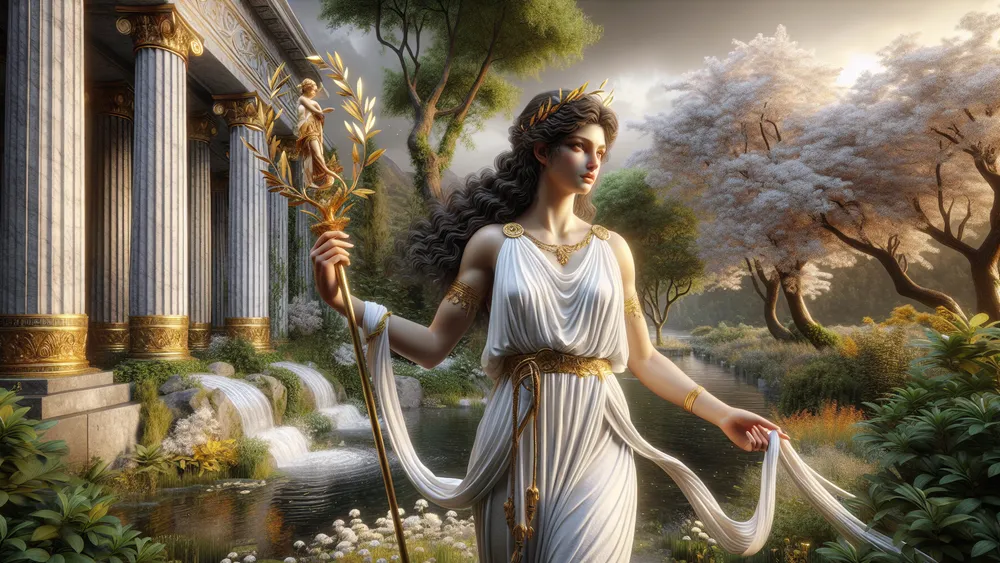
- Justice: Keeping things fair and equal in societal rules.
- Order: Making sure governance and nature stay organized.
- Harmony: Connecting human life, society, and nature together in balance.
- Accountability: Helping people follow rules and responsibilities.
- Moderation: Promoting balance in actions and choices.
How Eunomia Influenced Greek Cities
Eunomia stood for ideas like good order and fair government, ideas that acted as the foundation for political systems in many Ancient Greek city-states. Even without temples dedicated to her or organized forms of worship, her ideas were deeply rooted in how these cities saw themselves. Cities like Athens used the idea of Eunomia during important times of change.
For example, during the reforms led by Solon, people used her to highlight the importance of laws that balanced personal freedom with the needs of the public. Her symbolic role was often used to underline how essential it was to follow laws and maintain balance in the community.
This is not so different from how today’s societies rely on structured systems, like constitutions, to make sure fairness and responsibility remain in place. In that way, Eunomia represented a way of thinking about balance and fairness in city life. In Sparta, Eunomia had extra importance because it matched the strict and organized lifestyle they valued so much.
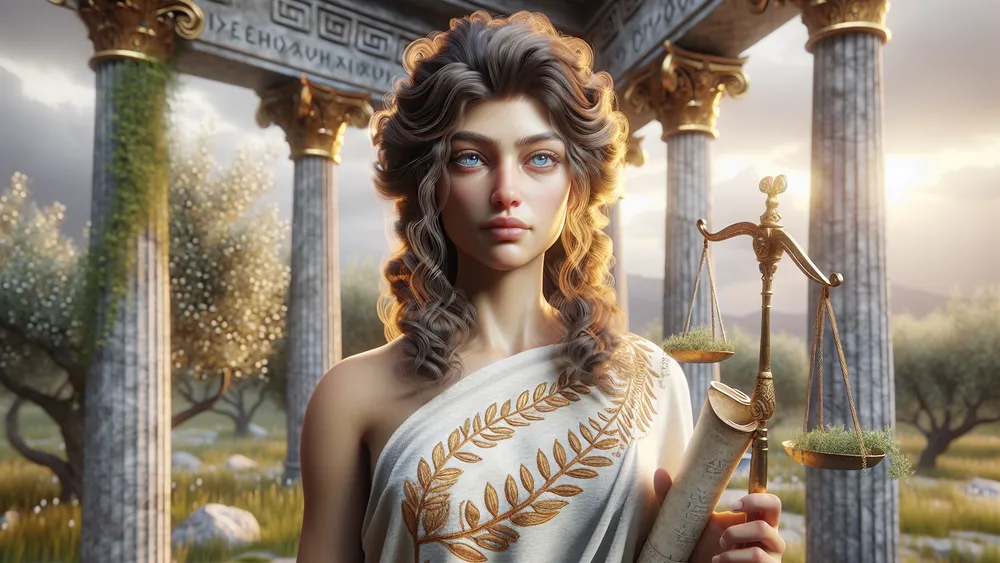
Tyrtaeus, a Spartan poet, praised Eunomia as something that brought peace, fairness, and unity, all of which fit tightly into their military-focused, rule-heavy society. He explained her as an idea that kept disorder and chaos away, emphasizing that laws and working institutions were things worth protecting.
For the Spartans, Eunomia stood for the belief that maintaining order wasn’t just good for society – it was something sacred, even connected to the gods. Because of this, her influence was not just about religion; she became a central idea for how Greek cities should work, giving structure to their political and social frameworks.
Comparing Eunomia, Dike, and Eirene
Eunomia, Dike, and Eirene are three goddesses known as the Horae. Together, they stand for ideas that help create a peaceful and well-functioning society. However, each goddess has her own specific role. Eunomia stands for Good Order. She is connected to creating fair rules and making sure things stay balanced. Dike, on the other hand, focuses on Justice.
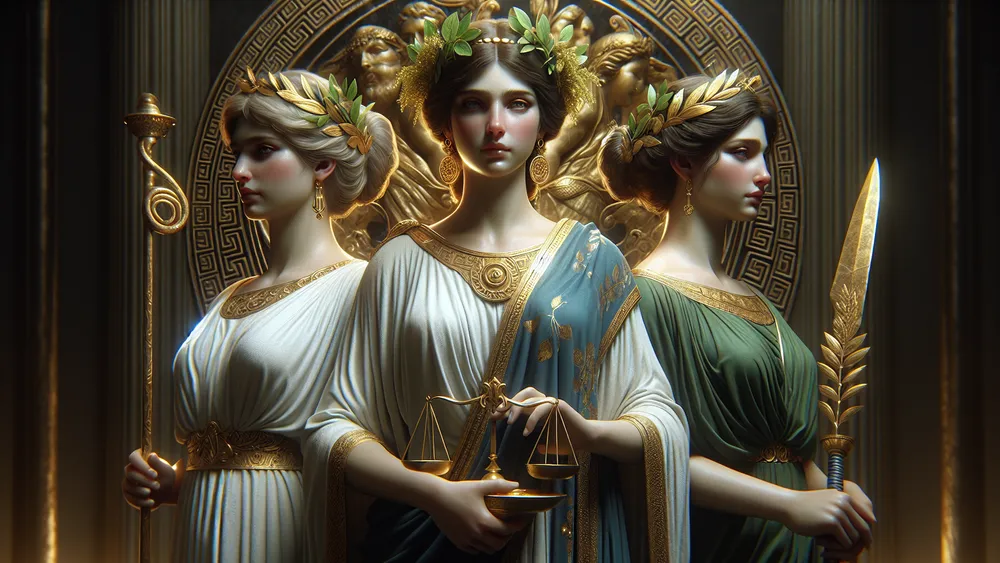
Her role deals with fairness and making sure people and gods follow ethical behavior. The third sister, Eirene, stands for Peace. Her focus is on creating calmness and prosperity when there is no conflict. When the three goddesses act together, they complement each other.
Eunomia lays the groundwork by focusing on order, Dike makes sure fairness works within that order, and Eirene keeps the peace afterward. This connection matches the Ancient Greek idea that a good society needs all three: order, justice, and peace. Sometimes, their roles overlap in ways that are not clearly defined. Let’s take an example.
Both Eunomia and Dike are connected to justice, but Eunomia is more about making rules that are easy to follow, while Dike thinks about enforcing those rules fairly. Eirene, on the other hand, is slightly different, focusing instead on peace and abundance. In art, people showed them with symbols to make their differences clear. Eunomia was shown with things like a scepter or flowers to represent leadership and balance.
Dike was often seen holding scales and a sword, which stand for fairness and judgment. At the same time, Eirene was drawn holding things like a cornucopia or olive branch, which symbolize peace and wealth.
Here is an overview comparing the three:
| Name | Role | Qualities | Art Symbols |
|---|---|---|---|
| Eunomia | Order and Rules | Balance, Leadership | Scepter, flowers, or staff |
| Dike | Fairness and Justice | Fairness, Judgment | Scales, sword, or law-related items |
| Eirene | Peace and Wealth | Calmness, Abundance | Cornucopia, olive branch, or wreath |
The Horae, three goddesses named Eunomia, Dike, and Eirene, represent order, justice, and peace, essential for a balanced and thriving society, with each having distinct roles and symbols.
Myths and Stories Involving Eunomia
After looking at what Eunomia means and how she impacts both society and myths, we can now think about her stories. These myths explain how she and her sisters worked together to keep balance and order in the universe and among people.
Stories About the Horae and Keeping the World in Balance
In Greek myths, people often saw the Horae as protectors of balance. They worked to keep harmony in the natural world, human society, and the divine realm. Eunomia and her sisters, Dike (Justice) and Eirene (Peace), had the job of keeping the universe in order. Their role tied them closely to Zeus and how things worked on Mount Olympus.
One well-known role they had was controlling who could enter Mount Olympus. Only gods and visitors who belonged there were allowed inside. Their work as gatekeepers meant they were critical for protecting balance, just as natural laws keep the world running smoothly. The poet Hesiod, in Works and Days, explained how the Horae were always alert to the world’s activities.
They made sure nature continued as expected by keeping the seasons changing and in order. Their connection to the natural world showed how Greeks thought about harmony in life – similar to how we think today about protecting the balance of ecosystems. The Horae did not often appear in longer myths. Instead, they were described in art and literature as symbols of balance.
For example, they were connected to how time moved forward as well as farming and fertility. They had responsibilities that were not personal but universal – they were not known for adventures but were part of how nature and society functioned smoothly. This was a reminder of how divine powers and daily life were connected in Greek beliefs.
To put their roles in modern terms, their work might compare to how environmental laws or city planning ensure stability and prevent chaos.
Key roles and duties they were connected to include:
- Gatekeepers of Mount Olympus: They controlled who could enter Mount Olympus and stood for the protection of both divine and cosmic balance.
- Regulators of Seasonal Cycles: They made sure seasons changed as they should, helping keep nature steady and predictable.
- Symbols of Social Order: They stood for peace, fairness, and good governance, ideas central to stable societies.
- Agriculture and Fertility: They were tied to farming success and helped create prosperity by keeping natural processes in order.

The Connection Between Eunomia and Eupheme
Eunomia, known as the goddess of good governance and structure, and Eupheme, tied to praise and positive speech, share an important relationship in Greek beliefs. Their connection is in how praise and communication act as tools to help keep things in order. Good governance, something that Eunomia represents, depends on respectful and honorable speech, which is what Eupheme stands for.
In Ancient Greece, running a government properly needed more than just balance and justice, which came from Eunomia. It also required recognizing virtues and successes in public ways, something tied to Eupheme. Public support, praise, or even formal acknowledgment of leaders helped strengthen the system. Similarly, today, ethical leaders often gain respect because of public recognition, awards, or support that reinforces their work.
Both Eunomia and Eupheme played roles in building the ideals of Greek life. Eunomia set the framework for following rules and staying lawful, while Eupheme helped those values stay strong by lending support and recognition. In Greek thinking, following rules led naturally to praise: when things were in order, people recognized and admired the actions of leaders and citizens who showed fairness and responsibility.
This works similarly to how organizations or leaders today gain trust – not just because of their actions, but because they inspire respect through their positive traits, which hold communities together. While myths rarely describe direct actions involving Eunomia and Eupheme, their ideas are connected. Their partnership explains how the Ancient Greeks thought about harmony in life, both in society and privately.
Eunomia’s Role in Greek Myths and Nature’s Forces
As the goddess of good order, Eunomia connects to both the rules of society and how nature behaves. In Greek mythology, she worked to keep balance for humans, gods, and even in the natural world. Her role was steady and important, helping everything stay organized across different realms.
This means she acted as a link between ideas about fairness and laws, as well as the predictable things in nature, like how seasons change. Together with her sisters, Dike and Eirene, Eunomia was essential for keeping everything in harmony, both in how the world worked and how people lived.
If you want to know more about how Eunomia fits among other gods tied to ideas or natural elements, you can look at a list of all the Greek Abstract and Natural Forces. These types of gods help us see how the Ancient Greeks thought of their universe. They imagined everything as being connected and ruled by divine concepts.
Eunomia‘s work was just one example of how Greek myths mixed rules and nature into one system.
FAQs
1. What does Eunomia mean in Ancient Greek?
“Eunomia” in Ancient Greek means “Good Order” or “Lawful Governance,” encapsulating ideals of harmony and proper conduct.
2. Was Eunomia worshipped in Ancient Greece?
Eunomia was not formally worshipped in Ancient Greece but was symbolically revered through civic traditions and ideals related to order and governance.
3. Are there equivalents of Eunomia in Roman or other mythologies?
Equivalents of Eunomia in Roman or other mythologies include the Roman goddess Concordia and the Egyptian concept of Ma’at, both embodying ideals of harmony and order.
4. What lessons can we learn from Eunomia’s myths?
The lessons we can learn from Eunomia’s myths emphasize the importance of good governance, harmony, and adherence to lawful order in maintaining societal balance.

